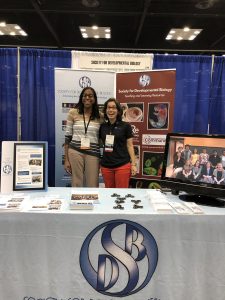Children’s author (and PLOS SciComm contributor) Patricia Newman is celebrating a landmark anniversary of her renowned book on improving our environment. In…
ABRCMS: A conference model that brings together key members of the biomedical science pipeline
For the last several years, my primary professional organization, the American Association of Anatomists (AAA), has sent a leadership delegation to connect with students at the Annual Biomedical Research Conference for Minority Students. This year, I was fortunate to attend for the first time and I was impressed with the strong mentorship programs for faculty and students. One of those programs is organized by the Federation of American Societies for Experimental Biology (FASEB), an umbrella organization that represents the science policy interests of 30 different member organizations on Capitol Hill, including AAA. Dr. Michelle Juarez, who has written previously for PLOS SciComm, participated as a faculty mentor in the FASEB-organized mentoring program described below.–JMO
Every year a unique scientific conference assembles biomedical scientists and students under one roof: ABRCMS (Annual Biomedical Research Conference for Minority Students). The conference is managed by the American Society for Microbiology (ASM) and funded by the National Institutes of General Medical Sciences (NIGMS). For many undergraduate students, ABRCMS is their first time attending a scientific meeting and presenting their research. Students attend scientific talks from inspirational speakers and gain skills to prepare them for success in graduate studies. Each year, as the conference travels to different locations within the U.S., a new group of scientists from local institutions and companies serve as judges for the student presentations. In addition, graduate students and postdocs serve as effective spokespeople to recruit for graduate programs. The overall collection of meeting participants promotes outstanding networking opportunities for biomedical scientists from a wide range of professions, including academia, industry, and governmental.

For many of the undergraduate attendees, they are first generation college students and have limited knowledge and access to specialized scientific conferences. The exposure to a wealth of knowledge and diversity of career options in the biomedical sciences is transformative. The graduate school fair in the exhibit hall is an efficient form of outreach and allows undergraduate students to appreciate the range of opportunities in distinct geographical regions. For many of the scientist attendees, this is there first time judging student presentations and recruiting future students to pursue degree in their disciplines. It can be reinvigorating to meet the next generation of trainees and absorb some of their enthusiasm for discovery.
One highlight of the conference is the opportunity for students learn more about scientific societies and their important roles in fostering trainee and research connections. The Federation of American Societies of Experimental Biology (FASEB) Office of Sponsored Programs, Diversity and Grants Administration brings together a special cohort of junior faculty and trainees, many of whom are members of FASEB’s scientific member societies, to help the undergraduate students practice their presentations – FASEB peer and faculty mentors. In addition, in the exhibit hall there are representative staff and faculty members from the professional scientific societies. The students can learn more about scientific meetings and courses organized by the scientific societies. In addition, information is available on scientific society sponsored travel awards and research programs.
Participating in ABRCMS is appropriate for trainees and scientists at all stages of their careers. The ABRCMS experience builds from an inclusive model of support and networking. As a first time attendee, it is amazing to feel connected to many other individuals working toward a vision of access to education and careers in biomedical sciences. As a returning attendee, it is an opportunity to reconnect with colleagues and students; to share recent accomplishments and promote the collective experience fostered by the ABRCMS environment.
Edited by Jason Organ, PhD, Indiana University School of Medicine.
Additional Resources
Annual Biomedical Research Conference for Minority Students
American Society for Microbiology (ASM)
National Institutes of General Medical Sciences (NIGMS)
Federation of American Societies for Experimental Biology (FASEB)
Want to stay connected with #SciCommPLOS or pitch an idea for a blog post? Tweet us at @SciCommPLOS or email us at scicommplos@gmail.com.
